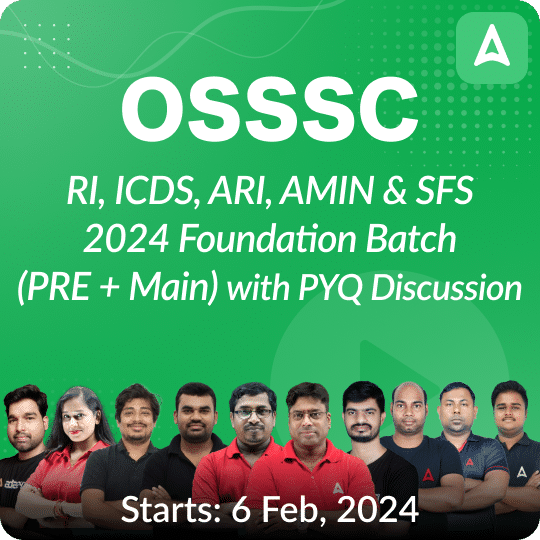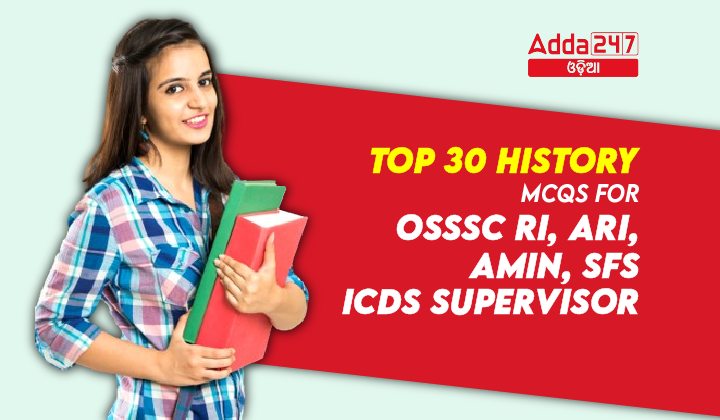History is a significant component of various competitive examinations, including those conducted by the Odisha Subordinate Staff Selection Commission (OSSSC) for the posts of Revenue Inspector (RI), Assistant Revenue Inspector (ARI), Amin, Statistical Field Surveyor (SFS), and Integrated Child Development Services (ICDS) Supervisor. To assist aspirants in their preparation, we’ve compiled a list of the top 30 multiple-choice questions (MCQs) covering crucial historical events, personalities, and concepts.
Top 30 History MCQs For OSSSC RI, ARI, Amin, SFS, ICDS Supervisor Exams
These questions cover various aspects of Indian history, providing a comprehensive review for OSSSC RI, ARI, Amin, SFS, and ICDS Supervisor exams. Good luck with your preparations!
- When was the capital of Odisha shifted from Cuttack to Bhubaneswar?
a) 1948
b) 1949
c) 1951
d) 1936
Answer: b) 1949 - Which British official played a significant role in addressing social issues such as female infanticide and human sacrifice among the Gonds of central India?
a) William Jones
b) Thomas Munro
c) Lord William Bentinck
d) Lord Hardinge
Answer: d) Lord Hardinge - Who initiated the abolition/prohibition of Sati in India?
a) William Jones
b) Thomas Munro
c) Lord William Bentinck
d) Lord Hardinge
Answer: c) Lord William Bentinck - Which of the following place is known as Soma Tirtha in Odisha?
a) Gupteswar
b) Kapilas
c) Puri
d) Ranipur Jharial
Answer: d) Ranipur Jharial - Which rock is used to build the Konark Sun Temple?
a) Marbles
b) Chlorite
c) Balasite
d) Khondalite
Answer: d) Khondalite - Who was the founder of Bhauma-Kara dynasty in Odisha?
a) Shubhakara-deva
b) Kshemankara deva
c) Vishnukara
d) Narakasura
Answer: b) Kshemankara deva - In ancient times, Odisha was known by the name of?
a) Tosali
b) Utkal
c) Kongoda
d) Kalinga
Answer: d) Kalinga - In ancient times, Bhumkar, a dynasty in Odisha, had trade relations with which country?
a) Egypt
b) Rome
c) Ceylon
d) Java
Answer: c) Ceylon - Which of the following regions was ruled by the Sailodbhava Dynasty?
a) South Kosala
b) Ganjam
c) Paralakhemundi
d) Cuttack
Answer: b) Ganjam - Which among the following ruling dynasties of Odisha witnessed the successful reign of queens?
a) Gajapati dynasty
b) Nanda Dynasty
c) Bhuma kara dynasty
d) Kalinga dynasty
Answer: c) Bhuma kara dynasty - The Gajapatis were a medieval Hindu dynasty that ruled over Kalinga from?
a) 1334-1441
b) 1434-1467
c) 1534-1541
d) 1434-1541
Answer: d) 1434-1541 - The kingdom of Odisha reached the zenith of its glory under which dynasty?
a) Ganga dynasty
b) Bhoi dynasty
c) Mukunda Deva
d) Mughal
Answer: a) Ganga dynasty - The great poet Jayadeva flourished during which dynasty in Odisha?
a) Gajapati
b) Ganga
c) Bhoi
d) Karrani
Answer: b) Ganga - When was the office of Governor-General created during British India?
A. 1773 AD
B. 1757 AD
C. 1760 AD
D. 1765 AD
Ans: A - Who was the first Governor-General of Bengal?
A. Roger Drake
B. Warren Hastings
C. Lord Cornwallis
D. Sir John Shore
Ans: B - Who among the following is popularly known as the ‘Father of Civil Services in India’?
A. Cartier
B. Harry Verelst
C. Lord Cornwallis
D. Warren Hastings
Ans: C - Which Act designated the Governor-General of Bengal and created an Executive Council of four members to assist him?
A. Regulating Act of 1773
B. Charter Act of 1833
C. Government of India Act of 1858
D. Indian Councils Act of 1861
Ans: A - Who was the Governor-General of Bengal when the Regulating Act of 1773 was passed?
A. Roger Drake
B. Warren Hastings
C. Lord Cornwallis
D. Sir John Shore
Ans: B - Which Governor-General reformed, modernized, and rationalized the civil service in India?
A. Warren Hastings
B. Charles Cornwallis
C. Harry Verelst
D. Sir John Shore
Ans: B - Which British official played a significant role in addressing social issues such as female infanticide and human sacrifice among the Gonds of central India?
a) William Jones
b) Thomas Munro
c) Lord William Bentinck
d) Lord Hardinge
Answer: d) Lord Hardinge - Who was the Governor-General of Bengal when the Indian Civil Service was formally established?
A. Warren Hastings
B. Charles Cornwallis
C. Harry Verelst
D. Sir John Shore
Ans: B - Which Act provided for the appointment of a Governor-General along with four Councillors in the Presidency of Fort William (Calcutta)?
A. Regulating Act of 1773
B. Charter Act of 1833
C. Government of India Act of 1858
D. Indian Councils Act of 1861
Ans: A - Who is credited with laying the foundation of the civil service in India?
A. Warren Hastings
B. Charles Cornwallis
C. Harry Verelst
D. Sir John Shore
Ans: A - Who is credited with abolishing the Dual system in British India?
a) Warren Hastings
b) Lord Cornwallis
c) Sir John Shore
d) Lord Wellesley
Answer: a) Warren Hastings - Which Governor-General implemented the Permanent Settlement in Bengal?
a) Warren Hastings
b) Lord Cornwallis
c) Sir John Shore
d) Lord Wellesley
Answer: b) Lord Cornwallis - Which policy of non-interference in Indian affairs was advocated by which Governor-General?
a) Warren Hastings
b) Lord Cornwallis
c) Sir John Shore
d) Lord Wellesley
Answer: c) Sir John Shore - Who introduced the Subsidiary Alliance system in British India?
a) Warren Hastings
b) Lord Cornwallis
c) Sir John Shore
d) Lord Wellesley
Answer: d) Lord Wellesley - Under whose tenure was the policy of Non-Interference implemented in British India?
a) Warren Hastings
b) Lord Cornwallis
c) Sir John Shore
d) Lord Wellesley
Answer: c) Sir John Shore - Who established the Asiatic Society of Bengal?
a) William Jones
b) Thomas Munro
c) Lord William Bentinck
d) Lord Hardinge
Answer: a) William Jones - Which British administrator introduced the Ryotwari settlement in Madras?
a) William Jones
b) Thomas Munro
c) Lord William Bentinck
d) Lord Hardinge
Answer: b) Thomas Munro









